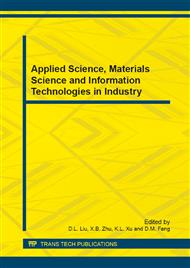[1]
D. Biskup, A state-of-the-art review on scheduling with learning effects, European Journal of Operational Research, 188 (2008), 315-329.
DOI: 10.1016/j.ejor.2007.05.040
Google Scholar
[2]
S. Gawiejnowicz, Time-dependent scheduling, Springer, Berlin, (2008).
Google Scholar
[3]
R.L. Graham, E.L. Lawler, J.K. Lenstra and A.H.G. Rinnooy Kan, Optimization and approximation in deterministic sequencing and scheduling: a survey, Annals of Discrete Mathematics, 5 (1979), 287-326.
DOI: 10.1016/s0167-5060(08)70356-x
Google Scholar
[4]
S. Xiang, G. Tang and T.C.E. Cheng, Solvable cases of permutation flowshop scheduling with dominating machines, International Journal of Production Economics, 66 (2000), 53-57.
DOI: 10.1016/s0925-5273(99)00106-1
Google Scholar
[5]
J. -B. Wang, T.C.E. Cheng, Scheduling problems with the effects of deterioration and Learning, Asia-Pacific Journal of Operational Research, 24 (2007), 245-261.
DOI: 10.1142/s021759590700122x
Google Scholar
[6]
J. -B. Wang, C. -J. Hsu, D. -L. Yang, Single-machine scheduling with effects of exponential learning and general deterioration, Applied Mathematical Modelling, 37(2013), 2293-2299.
DOI: 10.1016/j.apm.2012.05.022
Google Scholar
[7]
J. -B. Wang, L. Liu, C. Wang, Single machine SLK/DIF due window assignment problem with learning effect and deteriorating jobs, Applied Mathematical Modelling, 37 (2013) 8394-8400.
DOI: 10.1016/j.apm.2013.03.041
Google Scholar
[8]
J. -B. Wang, J. -J. Wang, Flowshop scheduling with a general exponential learning effect, Computers and Operations Rearch 43 (2014) 292-308.
DOI: 10.1016/j.cor.2013.09.001
Google Scholar
[9]
J. -B. Wang, J. -J. Wang, Scheduling jobs with a general learning effect model, Applied Mathematical Modelling, 37 (2013) 2364–2373.
DOI: 10.1016/j.apm.2012.05.029
Google Scholar
[10]
J. -B. Wang, M. -Z. Wang, Minimizing makespan in three-machine flow shops with deteriorating jobs, Computers and Operations Research, 40 (2013) 547-557.
DOI: 10.1016/j.cor.2012.08.006
Google Scholar


